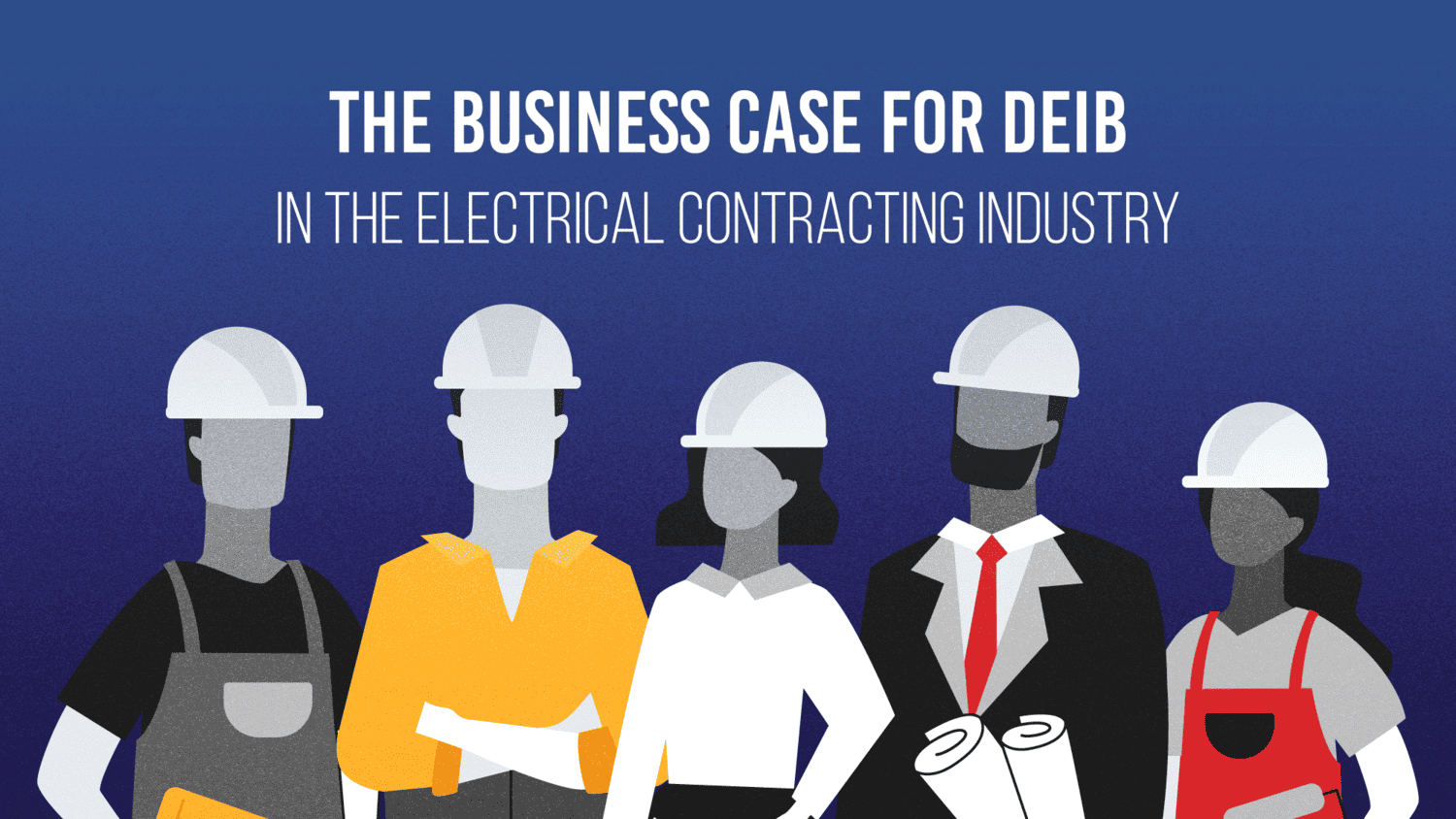The financial and operational benefits of initiating DEIB practices are some of the things you need to consider as a contractor. DEIB or Diversity, Equity, Inclusion, and Belonging are key terms making their way into how contractors recruit talent and manage employees. It’s not just a mere profiling or demographic inventory, as DEIB also puts businesses into a financial and operational advantage. The more diverse and inclusive an organization is, the more edge they have when it comes to providing services in the community.
The Current State of DEIB in the Electrical Contracting Industry
While DEIB has long been the goal of many contractors, there is still much work needed to be done for the electrical contracting industry to stand its ground as a welcoming sector. The gender gap is perhaps one of the biggest challenges when it comes to DEIB in the electrical contracting industry.
97.7% of electricians in the US are men, with only 2.32% women electricians in 2020. Although, various efforts have been made to address the gender gap. Accomplished tradeswomen share their stories of success in the trades sector to attract more women into electrical work.
When it comes to race, electricians in the US are 63.6% White, 20.5% Hispanic or Latino, Black Americans comprise 8.5%, and Asians are at 2.2%. There are initiatives aimed at recruiting young people from different backgrounds to join the trades. This is to bridge the gap between retiring electrical workers and spur interest among young people, especially those from minorities, to participate in the trades.
Financial Benefits of DEIB
A. Increased Innovation and Creativity
Diverse teams generate more innovative solutions when faced with challenges in the industry. By combining different perspectives, they generate progressive solutions. It will no longer be a monopoly of ideas – as is the standard with less diverse teams. Rather, innovative thinking is the norm brought about by people who are and think differently.
The potential for a business to increase its revenue is possible by creating a more diverse team. Boston Consulting Group (BCG) found that companies with a diverse management team had a 19% higher revenue. This is in big part thanks to innovative approaches diverse teams bring.
B. Enhanced Customer Relationships
Contracting firms serve a myriad of customers who come from diverse backgrounds. This comes as a challenge when building rapport and establishing better relationships with them. Customers may have specific requirements when it comes to doing business with contractors, which may include cultural business practices.
With the help of a diverse culture, a contractor can better understand the customer’s needs and be more collaborative towards them. A study from a large retail organization consisting of 59,592 employees and 1.2 million customers showed how having a climate of diversity resulted in customer satisfaction. The same diversity culture practices can also be done by electrical contractors seeking ways to improve customer relationships.
C. Attraction and Retention of Top Talent
The skills and expertise of a knowledgeable crew can be retained better when they see that they are valued. DEIB exemplifies a sense of respect among employees regardless of their background, allowing top talent to feel identified and to consider staying in the firm long term. It helps build a culture of openness and respect when people from diverse backgrounds see their ideas being recognized.
When an organization is more inclusive, it attracts skilled individuals by making them feel valued. A good example of an inclusion program is T-Mobile’s ERGs or employee resource groups. ERGs are groups created by and comprised of employees focused on a specific commonality that group members share or support. By implementing ERGs, T-Mobile has seen its retention rates improve.
Operational Benefits of DEIB
A. Improved Employee Engagement and Productivity
An inclusive workplace fosters higher employee engagement as they are more open to each other’s differences. It stirs up conversation when employees come from diverse backgrounds, knowing that their ideas and contributions to a firm are considered and recognized.
Diversity goals and inclusive policies make workers feel satisfied in the workplace. As diverse organizations, contractosr can implement openness, transparency of the system, and fair labor practices.
B. Reduced Legal and Reputational Risks
The importance of DEIB is also beneficial when it comes to mitigating legal and reputational risks. Insensitive workplace practices or company policies can damage the image of a firm.
As a contractor, you don’t want to get involved in a legal battle for discriminatory practices. DEIB initiatives help you protect your workplace and mitigate the legal risks that your business could face if it’s less inclusive.
C. Stronger Decision-Making and Problem-Solving
There is a better commitment when it comes to making decisions and solving problems. Instead of a monopolistic policy, the decisions are well-thought-out as the team considers every possible angle and perspective.
The Harvard Business Review even found out that cognitive diversity resulted in teams being able to solve problems faster. The influence of diverse gender, age, or ethnicity present in an organization enables teams to examine out-of-the-box solutions to their work problems.
Reap the Rewards of DEIB in Your Firm
DEIB improves the way contractors do business, and it comes from their employees. It starts with how engaging and productive employees are when it comes to making decisions and solving problems. There is a more innovative culture as ideas come from different perspectives – each one being considered to improve a firm’s operations.
Adopting DEIB practices brings a two-fold solution for a firm’s financial and operational challenges. For one, it makes employees more engaging and productive. Another is that an inclusive culture consequently builds rapport with customers from diverse backgrounds as well. You have innovative and creative ideas coming from employees. At the same time, there is a better relationship with customers. It improves your business revenue and smoothens your operations.
We cannot underestimate the benefits of integrating DEIB practices into your organization. As NECA members, we encourage electrical contractors in the industry to be proactive in building a more diverse and inclusive organization that provides equal opportunity to all.





